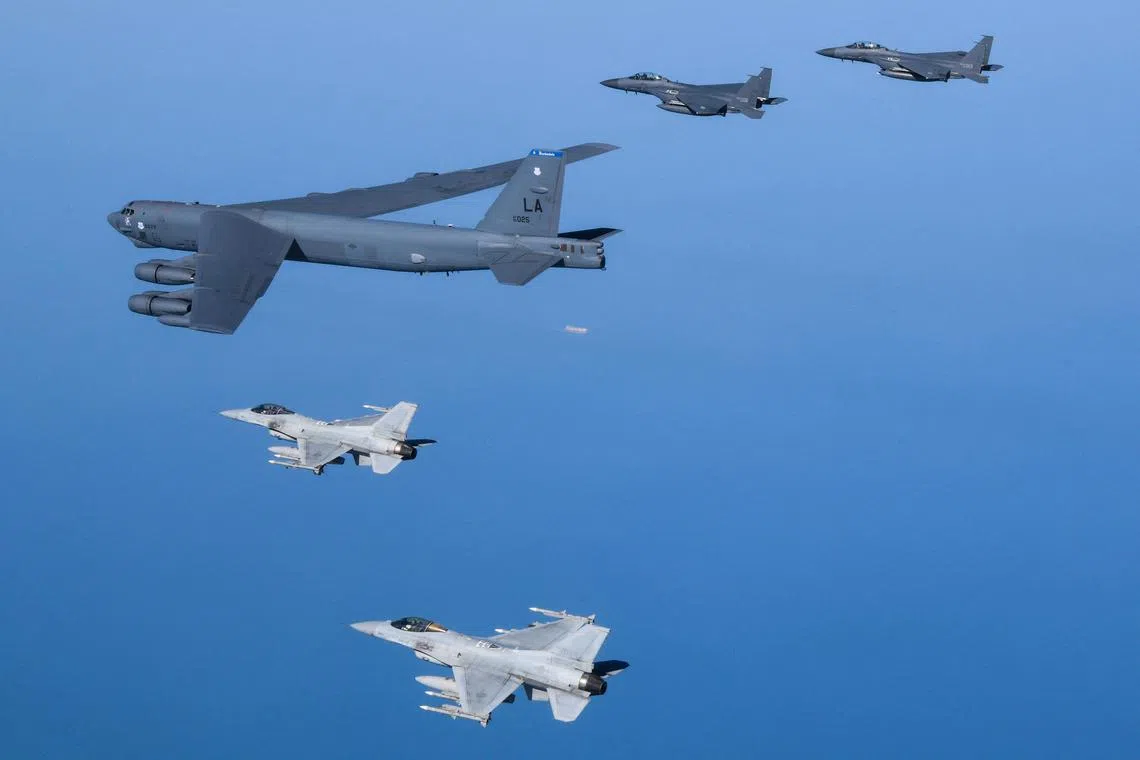US, South Korea kick off largest military drill in 5 years
Sign up now: Get insights on Asia's fast-moving developments

The US-South Korea exercises, called Freedom Shield, are scheduled to run for at least 10 days from March 13.
PHOTO: AFP
Follow topic:
SEOUL - South Korea and the United States on Monday kicked off their largest joint military exercise in five years, seen as a “declaration of war”.
Washington and Seoul have ramped up defence cooperation in the face of growing threats from the North, which has conducted a series of banned weapons tests in recent months.
The US-South Korea exercise, called Freedom Shield, is scheduled to run for at least 10 days and will focus on the “changing security environment” due to North Korea’s redoubled aggression, the allies said.
In a rare move, the Seoul military in March revealed that its special forces and the Americans were staging “Teak Knife” military exercises, which involve simulating precision strikes on key facilities in North Korea, ahead of Freedom Shield.
North Korea views such exercises as rehearsals for an invasion. It has said its nuclear weapons and missile programmes are for self-defence.
The Philippines and the US also launched army-to-army exercises at the same time, coming on the heels of President Ferdinand Marcos Jr’s decision last month to expand Washington’s access to his country’s military bases – a move that has infuriated China.
More than 3,000 Filipino and American soldiers will participate in the three-week long annual exercises called Salaknib, which involve multiple small-arms live-fire exercises, artillery and mortar live-fire events, and construction projects.
“The scenarios would involve the defence of the Philippine archipelago from potential foreign aggressors,” Army Chief Lieutenant-General Romeo Brawner told reporters following the opening ceremony.
Over the weekend, North Korea fired two “strategic cruise missiles” from a submarine in waters off its east coast, the official KCNA news agency reported on Monday.
“Pyongyang has military capabilities under development it wants to test anyway and likes to use Washington and Seoul’s cooperation as an excuse,” said Dr Leif-Eric Easley, a professor of international studies at Ewha University in Seoul.
Last year, the North declared itself an “irreversible” nuclear power and fired a record-breaking number of missiles. And leader Kim Jong Un last week ordered his military to intensify drills to prepare for a “real war”.
Shift in position?
The US has repeatedly restated its “ironclad” commitment to defending South Korea, including using the “full range of its military capabilities, including nuclear”.
South Korea, for its part, is eager to reassure its increasingly nervous public about the US commitment to so-called extended deterrence, in which US military assets, including nuclear weapons, serve to prevent attacks on allies.
Although the official policy of both countries towards the North – that Mr Kim must give up his nukes and return to the table for talks – has not changed, experts said there has been a practical shift.
Washington has “effectively acknowledged that Pyongyang will never give up its nuclear programme”, Dr An Chan-il, a defector turned researcher who runs the World Institute for North Korea Studies, told AFP.
This Freedom Shield training is the first since that happened, meaning it “will be very different – both qualitatively and quantitatively – from previous joint exercises that took place in recent years”, he added.
North Korea, which recently called for an “exponential” increase in weapons production, including tactical nukes, had been widely expected to respond with missile launches and drills of its own – with experts saying more were likely over the course of the US-South Korean exercises.
“North Korea will use the Freedom Shield 2023 Exercise to unify its people and as an excuse to further invest in weapons of mass destruction,” said Mr Chun In-bum, a retired South Korean army general.
“More missile launches with variations in style and scope should be expected with even a nuclear test. More acts of intimidation from North Korea should not come as a surprise.”
But senior researcher Hong Min at the Korea Institute for National Unification said Pyongyang was not expected to “cross the red line”. The North is likely to refrain from activities “at which the US and South Korea are forced to counter-strike in response”, he said. AFP

